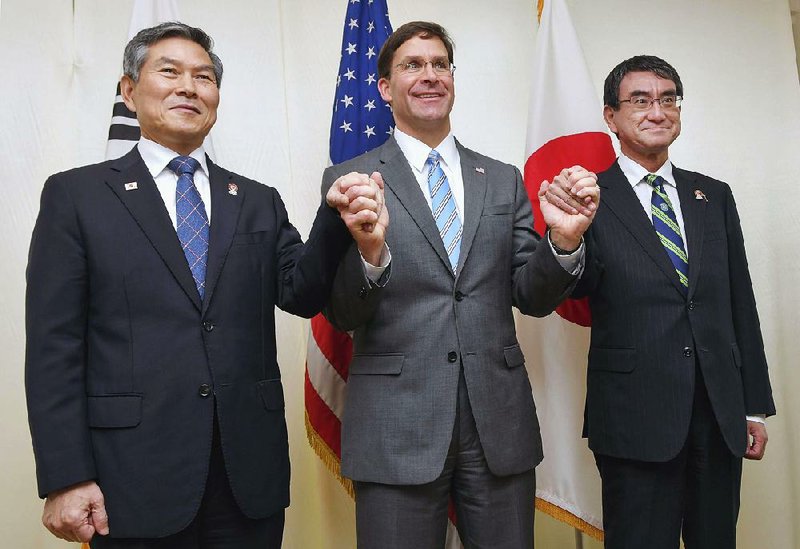BANGKOK -- U.S. Defense Secretary Mark Esper said Sunday that the United States and South Korea have indefinitely postponed a joint military exercise in an "act of goodwill" toward North Korea.
The announcement came just before Japan's defense minister, whose country feels threatened by repeated North Korean missile launches, told Esper that "no one could be optimistic about" changing the North's behavior.
The statement by Japan's defense chief, Taro Kono, was a stark illustration of the difficulties facing the U.S. and its international allies and partners as they struggle to get North Korea back to negotiations to eliminate its nuclear weapons and missiles. Talks initiated by President Donald Trump in 2018 have stalled, with no resumption in sight.
Although the U.S. military for years has seen its joint military exercises with South Korea as an important means of keeping troops and commanders ready for combat on short notice, Trump has called them a waste of money and a provocation to North Korea.
Esper announced the postponement of the military exercise at a joint news conference with his South Korean counterpart, Jeong Kyeong-doo. They were in Bangkok to attend an Asian defense ministers conference.
Esper insisted the postponement was not a concession to North Korea but rather was an attempt to "keep the door open" to diplomacy to eliminate North Korea's nuclear weapons.
"I see this as a good-faith effort by the United States and the Republic of Korea to enable peace, to shape ... to facilitate a political agreement -- a deal, if you will -- that leads to the denuclearization of the Korean Peninsula," Esper told reporters, using the official name of South Korea.
North Korea, however, did not respond positively.
In a statement, an unnamed Foreign Ministry spokesman said he had tried to interpret the U.S.' willingness to adjust the drills as part of a positive attempt to relieve tension and open a window for dialogue, but that this view had been shaken by a U.N. resolution adopted last week that criticized North Korea's human-rights record.
It was clear, the spokesman said, that the United States had not abandoned "its futile dreams of destroying our system," describing the issue of human rights as a pretext used by "imperialists" to invade countries that do not obey them.
The spokesman accused the United States of not being interested in repairing relations through dialogue.
"We are no longer motivated to face this opponent," the statement said, adding that nuclear issues will never be discussed unless the United States drops its "hostile policy."
The North has criticized U.S.-South Korean military drills as provocative and as preparations for an invasion.
Kono, the Japanese defense minister, met with Esper and Jeong after they made their announcement. In remarks with reporters and photographers present, Kono said it was important that the three nations consult closely "under the current situation where no one could be optimistic about North Korea."
He added that the North Koreans have launched "more than 20 missiles this year, including new types of missiles as well as a submarine-launched ballistic missile" in violation of U.N. Security Council resolutions.
Kono called North Korea "a serious threat to peace and stability" in Japan and across the region.
Esper told reporters that he did not consider the postponement a concession to North Korea, although it follows earlier cutbacks in the scale and prominence of U.S.-South Korean exercises.
"We have made this decision as an act of goodwill to contribute to an environment conducive to diplomacy and the advancement of peace," Esper said.
As recently as Friday, when Esper was in Seoul to consult with South Korean officials, there was no word on postponing the military air exercise, which had been called Vigilant Ace.
Seoul and Washington had scaled back the exercise recently and changed the name, but North Korea still strongly objected, calling it evidence of a lack of interest in improving relations.
Jeong said the exercise had been put off pending further consultations between Seoul and Washington. No new date has been set.
Esper said South Korea and the U.S. encourage North Korea "to demonstrate the same goodwill" as it considers decisions on its own military training, exercises and testing.
He also urged the North to return to the negotiating table "without precondition or hesitation."
Talks in Stockholm broke down last month, with North Korea accusing the United States of being vicious and crafty. North Korea has threatened to resume its nuclear and long-range missile tests unless the United States changes its negotiating stance.
Esper said that even without the planned exercise of South Korean and American air forces, both militaries "will remain at a high state of readiness" for potential combat.
The U.S. has about 28,000 troops in South Korea.
Information for this article was contributed by Robert Burns of The Associated Press and by Simon Denyer and Min Joo Kim of The Washington Post.
A Section on 11/18/2019
